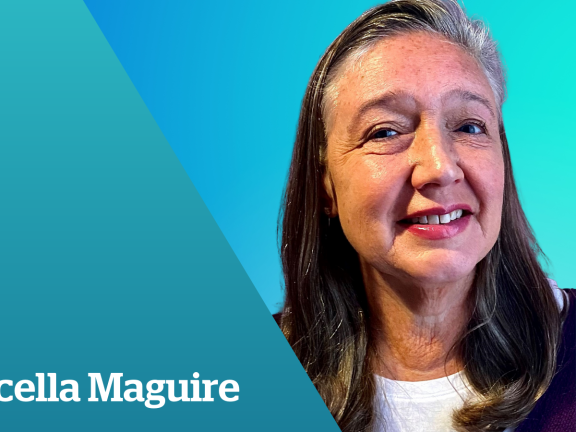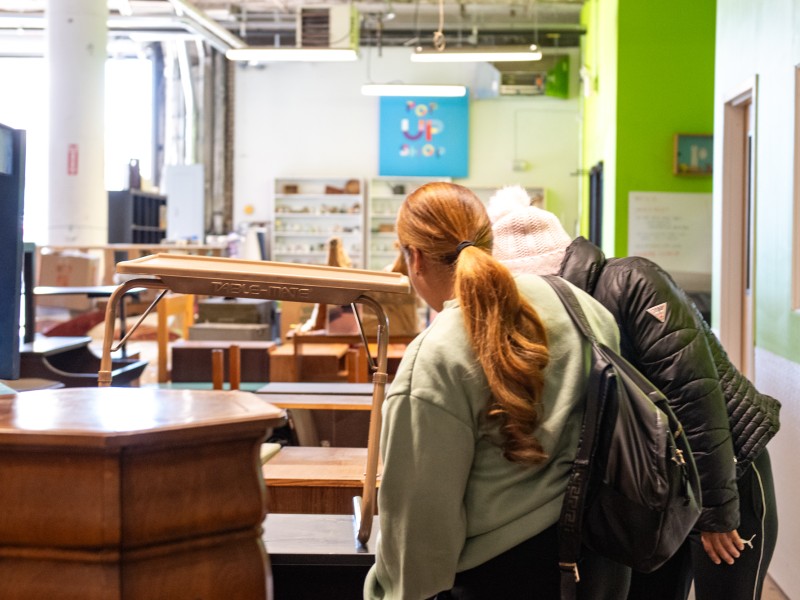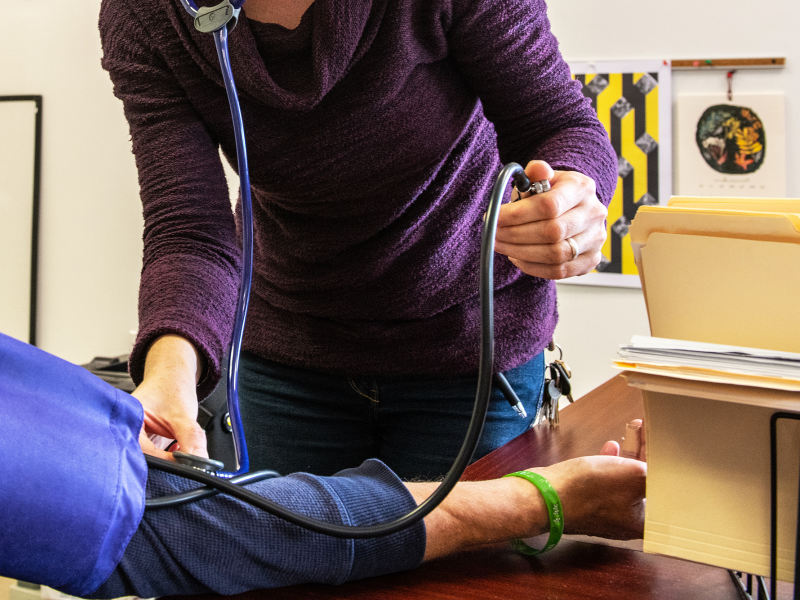The History Behind Housing First in Philadelphia with Dr. Marcella Maguire

We sat down for an interview with Dr. Marcella Maguire from the Corporation for Supportive Housing (CSH) to ask her about the Housing First model and how she spearheaded bringing the model to Philadelphia.
Marcella currently works for CSH as the Director of Health System Integration, leading their national health sector work at the intersection of health and housing. Marcella is a psychologist by training and was the third case manager hired by Washington DC’s first Assertive Community Treatment (ACT) team. After doing direct service work and leading programs and systems, Marcella worked for the Department of Behavioral Health and Intellectual disability Services (DBHIDS) and the Office for Drug and Alcohol Addiction Programs (CODAAP) in Philadelphia for 17 years before moving to CSH.
CSH is a national nonprofit with 29 offices in 13 states. They have local and national teams with a core agenda to increase supportive housing capacity and quality. Marcella told us that "no community has enough supportive housing. Our national needs assessment estimates 1.2 million additional units are needed nationwide to address people experiencing chronic homelessness, people ready to leave nursing homes or congregate-care facilities, incarceration, and all those other needs as well."
Marcella first learned of the Housing First Model through an Outreach Demonstration Grant in the 1990s. She told us, “The Housing First model was not started as a model. It was started as ‘we have people who have needs who are living on our streets who are mentally ill, have substance use disorders, and we have programs that are supposed to help those people, but they're not going to.’ Those programs require people to be clean and sober. They require people to prove they're clean and sober. They require you to make multiple appointments, and there was just a disconnect between what the programs were and what the people needed.”
“When I was a case manager back in DC in the 1990s, we were told to move people out of the hospital, but we weren't given any housing resources. I was soon invited to a meeting where I learned that HUD [the US Department of Housing and Urban Development] had a new program, the Outreach Demonstration Grant. The conversation in the policy circles was, why won't these people go in? From my perspective, I thought this was profoundly the wrong conversation to have. The HUD Outreach Demonstration Grant gave us some flexibility to say, you know, if all of the rules and all of the requirements were gone, could you help people to move in? And the answer was sure when we got the flexibility that we needed. But people also needed an intensive level of support systems. I was lucky that I was with an Assertive Community Treatment team. I was coming with psychiatrists and nurses, all of the resources that you have on your ACT teams, so it was a model that evolved from need and resources.”
When asked about bringing Housing First to Philadelphia, Marcella told us, “we had the same problems as DC; there was enormous political pressure to get people to move off the streets. An increasing recognition that most of the people who were living on the streets had some significant behavioral health issue, at least for the long term. Around 1999, we had safe havens, street outreach, and lots of good things. But I think the vision was always that people would be funneled towards the traditional system that requires you to be clean and sober, proving you've been clean and sober for a long period, that requires you to go to a day program that has a lot of requirements in order to be able to access it. That's great for some people, and there are some people that model is just never going to work for. As I looked at it at the system's level, these people are either most likely to die on the streets, or we will do something similar to what we did in DC. Or what Sam Tsemberis was doing in New York, which was move people into housing with the treatment team model around them. Housing First, not housing only, but housing first.”
When it comes to embracing Housing First in Philadelphia, Marcella gave “an enormous amount of credit” to Rob Hess. Rob ran homeless services in Philadelphia under Mayor John F. Street for five years and was eventually recruited to the same job in New York in 2006. Marcella tells us,” he was becoming aware of models like DC and New York and Los Angeles that were doing Housing First, and was like, Okay, how do we figure out how to get this too? How do we figure out how to get this model to Philadelphia? We don't have enough. We have a lot of tools in our toolbox, but we don't have all of the tools, and Housing First was a tool we didn't have in our toolbox and very much needed here.”
Horizon House ultimately became the first Housing First program in Philadelphia in 2003. Marcella’s opinion was that “Philly's a big city, there should be no monopolies, and there shouldn’t be only one agency. A lot of this, unfortunately, comes from tragedy. In January 1996 in DC, there was a woman named Joyce Adams who froze to death in the bus shelter outside of HUD. That's where the Outreach Demonstrations Grant came from.” Unfortunately, a similar situation occurred in Philadelphia in 2008. During a cold, hard winter, a gentleman who had been part of many programs here in Philly had been turned away from a shelter. He used a wheelchair, and the shelter couldn’t accommodate him one evening. He tried to roll his wheelchair across I-676 in the middle of the night, and a good Samaritan stopped to help. They were both struck and killed by another vehicle. Marcella remembers, “Mr. Nutter had been mayor for maybe a month or two, Don Schwarz was our new Deputy Mayor for Health and Social Services, and they were like, ‘okay, this isn't working, what are we doing? What are we going to do differently?’ And that gave us an opportunity to bring in Sam [Tsemberis, founder of the Housing First model] to bring in an agency that was solely dedicated to working with folks like the gentleman who we'd lost that evening.”
Marcella’s previous knowledge of Housing First and Pathways to Housing, plus a strong desire to ensure that more than one agency provided Housing First in Philadelphia, led to Sam being consulted about offering services in Philadelphia. Despite his expertise as the founder of Housing First, Sam wasn’t familiar with Philadelphia – that’s where our CEO, Christine Simiriglia, came in. Marcella shared, “Chris was the perfect person who had those values and had those experiences from the Access project [at Mental Health Partnerships], but was also known and respected throughout the Philly system.”
Marcella felt that one of the benefits of Housing First was that “this was not a model that bureaucrats and I count myself among them, sat in a room and came up with. This was a model that was in response to community needs, and that model evolved to address an evolving community need. It's the fundamental premise of the Biden administration's approach to homelessness. It should be the fundamental one to the cities as well.” HUD recently released the House America program, which is grounded in the Housing First model. Housing First is also now a requirement for most HUD programs.
Now that it’s 2022, and Pathways to Housing PA has been operating since 2009, Marcella told us that the data is “clearly showing us that people who tend to experience homelessness are aging. Homelessness is what we call a late baby boomer demographic; you're most likely to be chronically homeless if you're born between 1957 and 1962. I think we have to start thinking about what are the services that will be needed age-wise? What is the support and assistance people need to age in place? I think that's a really important, new frontier.”
Marcella sees the inherent tension of HUD embracing Housing first is that HUD funds housing only; they offer very little on the services side. However, in order for Housing First to be successful, housing must be paired with comprehensive wrap-around services. “Where I'm focused on in my work now is bringing that Medicaid funding, bringing home and community-based services, bringing in Medicare, bringing those other services funders to the table so people can get those services and models that they need. I also think there needs to be a lot more dialogue between people with lived expertise, people living on the streets, people who just came into housing, and what they need and what made a difference for them. People who make the decisions, we need to listen to their voices. We need to also understand how incredibly inequitable our systems are. African Americans make up 13% of our population and over 40% of the people experiencing homelessness in this country. There's a huge equity issue here. We need to resolve that as well.”
In her work at CSH, Marcella focuses on supporting people and programs in identifying financing for their projects. “I think there's a conversation about what it is that people need, and what are the models and the programs that we need, and then there's a conversation about the financing. I've chosen to focus the second half of my career on financing because I met hundreds of people who had fabulous ideas about the work they needed to do on the ground, and nobody had any idea how to start.”


